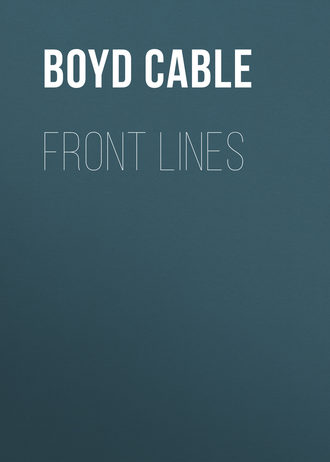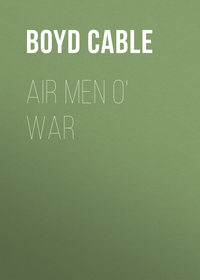
Front Lines
With the plan perfected, the two enthusiasts waited quite impatiently for the next strafe. Fortunately the moon was up fairly early, so that now there was no need to sit up late for the shoot, and the second night after the preparations were complete, to the joy of Guns and the R.O. (and the discomfort of the others), there was a beautiful, still, moonlight night with every inducement for the Huns to come along.
The two ate a hurried dinner with ears cocked for the first note of the warning which would sound when the distant noise of engines was first heard. Sure enough they had just reached the sweets when the signal went, and the two were up and off before the lights could be extinguished. They arrived panting at their stations to find the gun-crews all ready and waiting, made a last hasty examination to see everything was in order, and stood straining their ears for the moment when they reckoned the Huns would be approaching the barrage area, and when they judged the moment had arrived opened a long steady stream of fire. The drone of the first engine grew louder, passed through the barrage, and boomed on over the ’drome without missing a beat. There came the old familiar “Phe-e-e-w – BANG! … e-e-e-ew – BANG!” of a couple of falling bombs, and the first engine droned on and away. Two minutes later another was heard, and Guns and the R.O., no degree disheartened or discouraged by their first failure, let go another stream of lead, keeping the gun-muzzles twitching up and down as rapidly as they could. The second Hun repeated the performance of the first; and a third did likewise. After it was all over Guns and the R.O. held a council and devised fresh and more comprehensive plans, which included the use of some extra guns taken from the machines. For the moment we may leave them, merely mentioning that up to now and even in their newer plans they entirely neglected any consideration of rather an important item in their performance, namely, the ultimate billet of their numerous bullets.
From the point of view of the defence it is an important and unpleasant fact that an air barrage eventually returns to the ground. Guns and the R.O. had been pumping out bullets at a rate of some hundreds per minute each, and all those bullets after missing their target had to arrive somewhere on the earth. The gunners’ interest in them passed for the moment as soon as the bullets had failed to hit their mark, and afterwards they came to remember with amazement that ever they could have been so idiotically unconsidering.
Some distance from the ’drome, and in a line beyond the tip of the wood, there stood a number of Nissen huts which housed a Divisional Staff, and the inevitable consequence was that those up-and-down twitching gun-muzzles sprayed showers of lead in gusts across and across the hutments. The General Commanding the Division was in the middle of his dinner with about five staff officers round the table when the first “aeroplane over” warning went on this particular night of the new air barrage. The lights in the Mess hut were not extinguished, because full precautions had been taken some nights before to have the small window-space fully and closely screened against the possibility of leakage of a single ray of light. One or two remarks were made quite casually about the nasty raiding habits of the Huns, but since no bombs had come near in the earlier raids, and the conclusion was therefore reasonable that the Divisional H.Q. had not been located, nobody there worried much over the matter, and dinner proceeded.
They all heard the drone of the Hun engine, and, because it was a very still night, they heard it rather louder than usual. Someone had just remarked that they seemed to be coming closer to-night, when the further remarks were violently interrupted by a clashing and clattering B-bang … br-r-rip-rap, ba-bang-bang, the splintering, ripping sound of smashed wood, the crash, clash tinkle of a bottle burst into a thousand fragments on the table under their startled eyes. The barrage bullets had returned to earth.
The group at the table had time for no more than a pause of astonishment, a few exclamations, a hasty pushing back of chairs, when rip-rap-bang-bang-bang down came the second spray of bullets from those jerking muzzles over on the ’drome. Now a bullet hitting any solid object makes a nasty and most disconcerting sort of noise; but when it hits the tin roof of a Nissen hut, tears through it and the wood lining inside, passes out again or comes to rest in the hut, the noises become involved and resemble all sorts of queer sounds from kicking a tea-tray to treading on an empty match-box. The huts were solidly sand-bagged up their outside walls to a height of some feet, but had no overhead cover whatever. The third burst from Guns and the R.O. arrived on the hut at exactly the same moment as the General and his Staff arrived on the floor as close as they could get to the wall and the protecting sandbags. They stayed there for some exciting minutes while Guns shot numerous holes in the roof, splintered the furniture, and shot the dinner piecemeal off the table.
The shooting and the hum of the enemy engine ceased together, and the General and his Staff gathered themselves off the floor and surveyed the wreckage about them. “I just moved in time,” said the Brigade-Major, and pointed to a ragged hole in the seat of his chair. “D’you suppose it was a fluke, or have they got this place spotted?” asked the Captain. “Nasty mess of the roof,” said someone else. The General confined himself to less coherent but much more pungent remarks on all Huns in general, and night-raiders in particular. They seated themselves, and the waiter was just beginning to mop up the smashed bottle of red wine, when the distant hum of another engine was heard. This time the barraged ones reached the floor just a shade ahead of the first tearing burst from Guns and the R.O., and again they held their breath and cowered while the bullets clashed and banged on the tin roof, smacked and cracked on the ground outside, beat another noisy banging tattoo across the next-door huts. The group stayed prone rather longer after the ceasing of fire and engine hum, and had little more than risen to their feet when the third outbreak sent them flinging down into cover again.
After another and very much longer pause they very gingerly resumed their places at the table, sitting with chairs turned to positions which would allow evacuation with the least possible delay. The conversation for the rest of the dinner was conducted in hushed whispers and with six pair of ears on the alert for the first suspicion of the sound of an approaching engine. It was agreed by all that the Hun must have them spotted, and the only matter for surprise was that some of the bombs heard exploding in the distance had not been dropped on them. It was also agreed very unanimously, not to say emphatically, that the first job for a party in the morning was the digging of a solidly constructed dug-out. “Sand-bags on the roof might be good enough for bullets,” said the General, “but we’ve got to allow for bombs next time, and there’s nothing for that but a good dug-out.”
Someone suggested moving the H.Q., but this was rejected since they were busy at the time, and it would mean a good deal of time lost and work dislocated. The General decided to hang on for a bit and see what turned up.
Next morning dug-outs were started and thickish weather the next night prevented further raids and allowed satisfactory progress to be made on the shelters. The following night was clear again, but dinner passed without any alarm, and everyone, except the Brigade-Major, who had some urgent work to keep him up, turned in early.
At about 11.30 p.m. the first Hun came over, and at the ’drome the waiting and expectant Guns and R.O. set up their new and improved barrage, with four machine-guns all carefully trained and set to sweep over the same end of the same wood.
The General was awakened by the first tea-tray bang-banging on adjacent tin roofs, and, without pausing to think, rolled out of bed and bumped on to the floor just as a couple of strays from the outside edge of the barrage banged, ripped, and cracked through his roof and walls. He crawled at top pace to the wall, cursing his hardest, groped round in the dark and found a pair of boots and a British Warm, struggled into these, sitting on the cold floor in his pyjamas, while a tornado of bullets hailed and clashed and banged across the Nissen hut roofs of the camp. He took a quick chance offered by a lull in the firing, flung the door open, and set off at a floundering run for the dug-out. As he doubled along the duckboards he heard the droning roar of an engine coming closer and closer, made a desperate spurt, expecting every moment to hear the ominous whistle and resounding crash of a falling and bursting bomb, reached the dug-out entrance, hurled himself through it, and fell in a heap on top of the Brigade-Major cautiously feeling his way down the dark steps. They reached the bottom in a tumbled heap and with a bump, their language rising in a mingled and turgid flow to the delighted ears of a Staff-Lieutenant, shivering at the top of the stairs in his pyjamas with his breeches under his arm and his tunic thrown round his chilly shoulders. But his grins cut off short, and he, too, hurtled down the steps as a bomb burst a few hundred yards off with a resounding and earth-shaking crash.
Sitting there in the dark for the next hour the General meditated many things, including the mysterious ways of air Huns who so accurately machine-gunned his camp, and yet dropped nine out of ten of their bombs at various distances up to a full mile away from it.
This mystery led him next day to diverge from his way and ride across the fields to the ‘drome to make a few inquiries into the ways of night-fliers. Guns was busy making some adjustments to his barrage guns with renewed determination to bring a Hun down some night. The General saw him, and rode over and asked a few questions, and listened with a growing suspicion darkening his brow to Guns’ enthusiastic description of the barrage plan. He cut Guns short with an abrupt question, “Where do your bullets come down?”
Guns paused in bewilderment, and stared vacantly a moment at the empty sky. Somehow now in daylight it seemed so very obvious the bullets must come down; whereas shooting up into the dark it had never occurred. The General pulled his horse round and rode straight over to the Squadron office. There he found the Major and a map, had the exact position of the barrage guns pointed out to him, and in turn pointed out where the H.Q. camp lay. The R.O., who was working in the outer office, sat shivering at the wrathful remarks that boiled out of the next room and ended with a demand for the presence of the Gunnery Officer. The R.O. himself departed hurriedly to send him, and then took refuge in the hangar farthest removed from the office. A sense of fair play and sharing the blame drove him reluctantly back to the office in time to hear the effective close of the General’s remarks.
“Barrage, sir! – barrage! Splashing thousands of bullets all over a country scattered with camps. Are you mad, sir? Air barrage! Go’ bless your eyes, man, d’you think you’re in London that you must go filling the sky with barrages and bullets and waking me and every other man within miles with your cursed row. Suppose you had shot someone – suppose you have shot someone. Blank blank your air barrage. You’d better go back to England, where you’ll be in the fashion with your air barrages and anti-aircraft. Am I to be driven from my bed on a filthy cold night to …” he spluttered explosively and stopped short. If the Division heard the details of his share in the incident, had the chance to picture him racing for the dug-out, sitting shivering in scanty night attire, and add to the picture as they’d certainly do, the joke would easily outlive the war and him. “That will do, sir,” he said after a brief pause, “I’ll have a word with your Major and leave him to deal with you.”
Guns came out with his head hanging, to join the pale-cheeked R.O. and escape with him.
Ten minutes after a message came to him that the General wanted him in the C.O.’s office, and Guns groaned and went back to hear his sentence, estimating it at anything between “shot at dawn” and cashiered, broke, and sent out of the Service.
Now, what the C.O. had said in those ten minutes nobody ever knew, but Guns found a totally different kind of General awaiting him.
“Come in,” he said, and after a pause a twinkle came in his eye as he looked at the dejected, hangdog air of the culprit. “H-m-m! You can thank your C.O. and the excellent character he gives you, sir, for my agreeing to drop this matter. I think you realise your offence and won’t repeat it. Zeal and keenness is always commendable; but please temper it with discretion. I am glad to know of any officer keen on his work as I hear you are; but I cannot allow the matter to pass entirely without punishment…” (Guns braced himself with a mental “Now for it.”) “… So I order you to parade at my Headquarters at 7.30 to-night, and have dinner with me.” He paused, said, “That’ll do, sir,” very abruptly, and Guns emerged in a somewhat dazed frame of mind.
He said, after the dinner, that the punishment was much worse than it sounded. “Roasting! I never had such a dose of chaffing in my life. Those red-tabbed blighters … and they were all so infernally polite with it … it was just beastly – all except the General. My Lord, he’s a man, a proper white man, a real brick. And he was as keen to know all about machine-guns as I am myself.”
“Well, you taught him something about them – especially about barrages and the result of indirect fire,” said the Mess, and, “Are you going to barrage the next Huns?”
But on his next barrage plans, Guns in the first place – the very first and preliminary place – used a map, many diagrams, and endless pages of notebooks in calculations on where his bullets would come down.
VIII
NIGHTMARE
Jake Harding from early childhood had suffered from a horribly imaginative mind in the night hours, and had endured untold tortures from dreams and nightmares. One of his most frequent night terrors was to find himself fleeing over a dreary waste, struggling desperately to get along quickly and escape Something, while his feet and legs were clogged with dragging weights, and dreadful demons and bogies and bunyips howled in pursuit. This was an odd dream, because having been born and brought up in the bush he had never seen such a dreary waste as he dreamed of, and had never walked on anything worse than dry, springy turf or good firm road. There was one night he remembered for long years when he had a specially intensified edition of the same nightmare. It was when he was laid up as a child with a broken arm, and a touch of fever on top of it, and he went through all the usual items of dreary waste, clogged feet trying to run, howling demons in pursuit, and a raging, consuming throat-drying fear. He woke screaming just as he was on the point of being seized and hurled into a yawning furnace filled with flaming red fire, saw a dim light burning by his bedside, felt a cool hand on his brow, heard a soothing voice murmur, “H-sh-sh! There’s nothing to be afraid of. You’re quite safe here. Go to sleep again.”
“I’m glad, Nursie,” said Jake, “I’m glad I’ve waked up; I’ve had a drefful dream.”
All that is a long way back, but it serves to explain, perhaps, why Long Jake, 6 ft. 3 in. in height, thin as a lath, but muscled apparently with whipcord and wire rope, known throughout the regiment as a “hard case,” felt a curious and unaccountable jerk back to childhood in his memory as he lay on the edge of a wet shell-hole peering out into the growing grey light. “I’ve never been up here before,” he thought wonderingly, “and I’ve never seen any bit of front like it. Yet I seem to know it by heart.” He knew afterwards, though not then, that it was the “dreary waste” of past dreams – a wide spreading welter of flat ground, broken and tumbled and torn and shiny wet, seen dimly through a misty haze, with nothing in sight but a few splintered bare poles of trees.
But Long Jake did not get much time to cudgel his memory. It was almost time for the battalion to “go over the top,” although here to be sure there was no top, and the going over merely meant their climbing out of the chain of wet shell-craters they occupied, and advancing across the flat and up the long slope. Both sides were shelling heavily, but the British, as Jake could judge, by far the heavier of the two. The noise was deafening. The thunder of the guns rose roaring and bellowing without an instant’s break. Overhead the shells howled and yelled and shrieked and whistled and rumbled in every conceivable tone and accent from the slow, lumbering moan and roll of a passing electric tram to the sharp rush of a great bird’s wings. The ground quaked to the roll of the guns like jelly in a shaken mould; out in front of them the barrage was dropping into regular line, spouting in vivid flame that rent the twisting smoke veil quick instant after instant, flinging fountains of water and mud and smoke into the air.
Jake heard no order given, did not even hear any whistle blown, but was suddenly aware that dim figures were rising out of the shell-holes to either side, and moving slowly forward. He scrambled out of his crater and moved forward in line with the rest. They went close up to the line of our bursting shells, so close that they could see the leaden hail splashing and whipping up the wet ground before them, so close that Jake more than once ducked instinctively at the vicious crack above his head of one of our own shells bursting and flinging its tearing bullets forward and down. But the line pressed on, and Jake kept level with it; and then, just when it seemed that they must come into that belt of leaping, splashing bullets, the barrage lifted forward, dropped again twenty or thirty yards ahead in another wall of springing smokeclouds and spurting flame.
Jake pushed on. It was terribly heavy going, and he sank ankle deep at every step in the soft, wet ground. It was hard, too, to keep straight on, because the whole surface was pitted and cratered with holes that ran from anything the size of a foot-bath to a chasm big enough to swallow a fair-sized house. Jake skirted the edges of the larger holes, and plunged in and struggled up out of the smaller ones. The going was so heavy, and it was so hard to keep direction, that for a long time he thought of nothing else. Then a man who had been advancing beside him turned to him and yelled something Jake could not hear, and next instant lurched staggering against him. Jake just caught a glimpse of the wild terror in the staring eyes, of the hand clutched about the throat, and the blood spurting and welling out between the clenched fingers, and then the man slid down in a heap at his feet. Jake stooped an instant with wild thoughts racing through his mind. What was he to do for the man? How did one handle – couldn’t stop bleeding by a tourniquet or even a tight bandage – choke the man that way – why’n blazes hadn’t the ambulance classes told them how to handle a man with a bullet in his throat? (The answer to that last, perhaps, if Jake had only known, being that usually the man is past handling or helping.)
Then before Jake could attempt anything he knew the man was dead. Jake went on, and now he was conscious of vicious little hisses and whutts and sharp slaps and smacks in the wet ground about him, and knew these for bullets passing or striking close.
The barrage lifted again, this time before they were well up on it, and the line ploughed on in pursuit of it. That was the third lift. Jake tried to recall how many times the pretended barrage had lifted in the practice attacks behind the lines, how many yards there were there from their own marked position to the taped-out lines representing the German positions.
Then through the bellowing of the guns, the unceasing howl of the shells, the running crashes of their bursts Jake heard a sharp tat-tat-tat, another like an echo joining it, another and another until the whole blended in a hurrying clatter and swift running rattle.
“Machine-guns,” he gasped. “Now we’re for it,” but plunged on doggedly. He could see something dimly grey looming through the smoke haze, with red jets of fire sparkling and spitting from it … more spurting jets … and still more, both these last lots seen before he could make out the loom of the block-house shelters that covered them. Jake knew where he was now. These were the concrete redoubts, emplacements, “pill-boxes.” But they were none of his business. Everyone had been carefully drilled in their own jobs; there were the proper parties told off to deal with the pill-boxes; his business was to push straight on past them, clearing any Germans out of the shell-hole they might be holding, then stop and help dig some sort of linked-up line of holes, and stand by to beat off any counter-attack. So Jake went steadily on, looking sharply about him for any Germans. A rifle flamed suddenly from a couple of yards ahead of him, and he felt the wind of the bullet by his face, thought for a moment he was blinded by the flash. But as he staggered back a bomber thrust past him and threw straight and hard into the shell-hole where the rifle had flashed. Jake saw a jumping sheet of flame, heard the crash of the bomb, felt the shower of dirt and wet flung from off the crater lip in his face, steadied himself, and plunged off after the hurrying bomber.
The next bit was rather involved, and Jake was never sure exactly what happened. There were some grey figures in front of him, scurrying to and fro confusedly, some with long coats flapping about their ankles, others with only half bodies or shoulders showing above the shell-hole edges. He thought some were holding their hands up; but others – this was too clear to doubt – were shooting rapidly at him and the rest of the line, the red tongues of flame licking out from the rifles straight at them. Jake dived to a shell hole and began firing back, felt somebody slide and scramble down beside him, turned to find the bomber picking himself up and shaking a blood-dripping left hand. “Come on, Jake,” yelled the bomber. “Rush ’em’s the game,” and went scrambling and floundering out of the hole with Jake close at his heels. There was a minute’s wild shooting and bombing, and the rest of the Germans either ran, or fell, or came crouching forward towards them with their empty hands high and waving over their heads.
An officer appeared suddenly from somewhere. “Come along. Push on!” he was shouting. “Bit further before we make a line to hold. Push on,” and he led the way forward at a staggering trot. Jake and the others followed.
They reached the wide flattened crest of the slope they were attacking and were pushing on over it when a rapid stutter of machine-gun fire broke out on their left flank, and a stream of bullets came sheeting and whipping along the top of the slope. The line was fairly caught in the bullet-storm, and suffered heavily in the next minute. There was some shooting from shell holes in front, too, but that was nothing to the galling fire that poured on them from the flank. Jake heard suddenly the long, insistent scream of a whistle, looked round and saw an officer signalling to take cover. He dropped promptly into a shell crater, and, hearing presently the bang of rifles round him, peered out over the edge for a mark to shoot at. Out to his left he caught sight of a sparkle of fire, and heard the rapid clatter of the machine-guns. He could just make out the rounded top of a buried concrete emplacement, and the black slit that marked the embrasure, and began to aim and fire steadily and carefully at it. The emplacement held its fire more now, but every now and then delivered a flickering string of flashes and a venomous rat-at-at-at. Jake kept on firing at it, glancing round every little while to be sure that the others were not moving on without him. The noisy banging raps of close-by machine-gunning broke out suddenly, and on Jake looking round from his shell hole he found a gun in action not more than a dozen yards away; and while he looked another one began to fire steadily from another shell crater fifty or sixty yards farther along. Jake crawled out of his hole, slithered over the rough ground and down into the crater where the nearest machine-gun banged rapidly. A sergeant was with the team, and Jake bawled in his ear, “If you’ll keep pottin’ at him every time he opens fire, I’ll try’n sneak over an’ out him with a bomb in the letter-box.”





